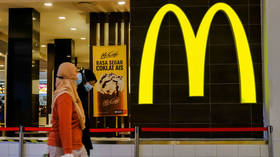Israel-linked boycotts of US brands boosting local businesses in Middle East – Bloomberg
Consumers in Muslim-majority countries have shunned Starbucks, McDonald’s, and Coca-Cola over the Gaza conflict
Numerous major Western brands have shed customers and seen profits dented due to boycott campaigns in the Middle East targeting companies seen as supporting Israel in the war in Gaza, Bloomberg reported on Friday.
Israel declared war on Hamas after the latter’s October 7 surprise attack that killed an estimated 1,200 Israelis. An Israeli offensive that followed has resulted in the reported deaths of over 30,000 Palestinians in the enclave, and sparked a wave of anti-Israel boycott movements in majority-Muslim countries of the region.
According to Bloomberg, the shares of Americana Restaurants International, which operates KFC, Pizza Hut, Krispy Kreme, and Hardee’s franchises in the Middle East, have dropped by 27% on the Saudi stock exchange in the past three months. Analysts expect the companies’ first-quarter profits to plunge on account of the boycotts.
Coca-Cola’s Turkish distributor saw sales volumes drop by 22% in the fourth quarter of 2023 against the previous three months, after the country’s parliament joined the boycott movement in November and said it would remove the soft drink from its cafeterias.
McDonald’s franchises in the region have experienced a “meaningful business impact” from boycotts, according to the fast-food giant’s CEO Chris Kempczinski, although he did not disclose the exact scope of the losses. The company has been in hot water among Middle Eastern customers since mid-October, when its franchisee in Israel boasted on social media that it was giving free meals to Israeli soldiers. Other Western corporations, including Starbucks, IBM and Nestle, have also faced boycotts.
“So far, whether McDonald’s or Starbucks, they’re hurting. [The perception that Washington favors Israel] really affects these corporations because America is implicated,” Fawaz Gerges, professor of Middle Eastern politics at the London School of Economics, told Bloomberg, commenting on the trend.
Meanwhile, local brands have seen a boost in business due to the boycotts. According to Bloomberg, in Kuwait, homegrown coffee stores saw earnings soar over the past three months, as customers largely stopped visiting Starbucks. Jordanian coffee chain Astrolabe saw sales jump by 30%, according to founder Moath Fauri. He noted that the chain has dropped American and French products across its branches and instead buys from local sources. In Egypt, the local soda brand Spiro Spathis has seen sales skyrocket, according to commercial director Youssef Atwan.
“Suddenly we were bombarded with orders from supermarkets, restaurants, we were trying hard to cope with the demand. Clients would go to restaurants and either ask for our brand or at least refuse to drink those on the boycott list,” he stated.
For more stories on economy & finance visit RT’s business section






Comments are closed.